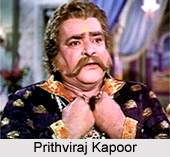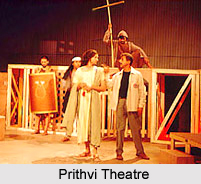 Prithvi Theatre, one of famous theatres in the Indian cities of Mumbai, belongs to the Kapoor family, one of the most influential actor/director families in Bollywood. This theatre is dedicated to the legendary Prithviraj Kapoor, as a great respect to his dream for Indian theatre. Subsidiary of this inimitable actor, this theatre was set up as a token of memoir, for all the theatre lovers of this nation. Established by Shashi Kapoor (the youngest son of Prithviraj Kapoor) and his wife Jennifer Kendel, both sharing a passion for theatre, they decided to go ahead and make this dream into a reality.
Prithvi Theatre, one of famous theatres in the Indian cities of Mumbai, belongs to the Kapoor family, one of the most influential actor/director families in Bollywood. This theatre is dedicated to the legendary Prithviraj Kapoor, as a great respect to his dream for Indian theatre. Subsidiary of this inimitable actor, this theatre was set up as a token of memoir, for all the theatre lovers of this nation. Established by Shashi Kapoor (the youngest son of Prithviraj Kapoor) and his wife Jennifer Kendel, both sharing a passion for theatre, they decided to go ahead and make this dream into a reality.
His career in Bollywood had spanned more than 40 illustrious years, but his passion for drama and theatre was something undying, very extraordinary and he cherished it forever. In 1927 Prithviraj left Edwards College, Peshawar, to pursue a career as an actor. He came to Bombay and joined the Imperial Studio Company, where he was selected to play the lead in a silent film "Cinema Girl" starring Ermelene, the screen goddess of her time. In 1931 he joined an English actor-manager`s travelling theatre group. In this group, he went ahead to perform many roles.
Prithviraj Kapoor, keeping this experience as a base, in 1944 he established his own Prithvi Theatres, which was a travelling theatre company. It consisted of about 150 members, the dedicated actors, stagehands, cooks, writers and technicians, performing plays throughout the country. The Prithvi Theatres maiden production was Kalidasa`s classic "Shakuntala", after which many famous plays were performed all over India and became immensely popular. These plays were written specifically for Prithvi Theatres and Prithviraj played the lead in all the productions. The Prithvi Theatres was one of the first professional Hindi theatre groups with a permanent staff, which worked on actively developing and nurturing a modern theatre movement.
The company visited 112 towns all over notching up an astonishing 2,662 shows in 5,982 days. Prithviraj Kapoor played the lead in every single show which meant an average of a show every third day. The company travelled third class and this included Prithviraj himself, even during the years when he was entitled to air or first class travel as a nominated Member of Parliament. Performance venues were mostly cinema halls, though some theatre halls did exist, as they were cheaper to rent. Electric fans were not allowed; instead each audience member was given a hand fan.
The acting style was very different from the high-emotion exaggerated melodrama of the commercial theatre. Though often declamatory, the dialogue delivery and overall production design aimed at being as realistic as possible. Prithviraj Kapoor strove for authenticity and hardcore reality. His idea of acting was based on minute observation and resolute training.
 Around this time Prithviraj felt the need for a theatre space, which would provide amateur theatre groups with professional facilities. With this in mind he leased out a plot of land in Juhu, Mumbai with the hope of some day building a theatre on it. Unfortunately before his dream could be pursued, he succumbed to death leaving behind a rich cultural legacy and a vision for Indian theatre. After the demise of Prithviraj Kapoor, Shashi Kapoor and Jennifer Kapoor decided to buy the land and set up a Trust in Shri Prithviraj`s memory with the intention of building a theatre to promote the performing arts and even helping the amateur theatre actors.
Around this time Prithviraj felt the need for a theatre space, which would provide amateur theatre groups with professional facilities. With this in mind he leased out a plot of land in Juhu, Mumbai with the hope of some day building a theatre on it. Unfortunately before his dream could be pursued, he succumbed to death leaving behind a rich cultural legacy and a vision for Indian theatre. After the demise of Prithviraj Kapoor, Shashi Kapoor and Jennifer Kapoor decided to buy the land and set up a Trust in Shri Prithviraj`s memory with the intention of building a theatre to promote the performing arts and even helping the amateur theatre actors.
They realized the great need for a unique theatre space, in order to rediscover the intimate actor-audience relationship. They also built a cafe attached to the theatre, which would be a meeting place for artists and art lovers. With a sincere dedication and realising Prithviraj`s dream, Shashi and Jennifer Kapoor inaugurated the Prithvi Theatre on the 5th of November, 1978. G.P. Deshpande inaugurated The Prithvi Theatre with the drama "Majma`s Udhwashth Dharamshala". Currently, Prithvi Theatre hosts over 400 performances a year, by over 40 groups.
Dedicated to encouraging professional theatre, Prithvi Theatre has made a conscious decision to keep its theatre rent down. Since that time, the Prithvi Theatre has endeavoured to act as a catalyst to nurture and develop Indian theatre over the years. Prithvi has presented a variety of different events and programmes like the famous Prithvi Festival, most of which have become part of the regular calendar of events of the Mumbai audience.
Aims of Prithvi Theatre
The Prithvi Theatre is a subsidiary of the Shri Prithviraj Kapoor Memorial Trust & Research Foundation. The Trust was set up in 1975 in the memory of Prithviraj Kapoor, to achieve the following aims:
* To build a theatre to promote professional Hindi theatre primarily, with all technical facilities available
* Subsidising and promoting aspiring and deserving stage artists, technicians, researchers etc.
* Managing a theatre of international standards - hosting and conducting workshops
* Providing rehearsal and workshop spaces
* Creating a theatre resource centre and research library (under construction)
* Providing medical and educational assistance to theatre workers and their children
* The Prithvi Theatre is a completely non-profit entity depending on the patronage of individuals and companies committed to the development of the performing and fine arts. Since its inception it is these sponsors who have enabled the theatre to grow and expand its activities.
Prithvi Festival
The first Prithvi Festival in 1983 was held to celebrate 5 years of successful growth in theatre groups, as well as the development of an audience. Since then the Prithvi Festivals have been conducted annually and it includes theatre groups; featuring local Bombay groups, or national or international in scope, with various themes. They have attempted to encourage quality and originality in local various Mumbai groups and also to bring some of the best and most interesting of Indian and world theatre to Mumbai in the interests of exposure. The Prithvi Theatre Festival has reached out to audiences beyond Mumbai also, touring its 1995 and 1997 Festivals to Delhi and its 2000 festival to Pune.




